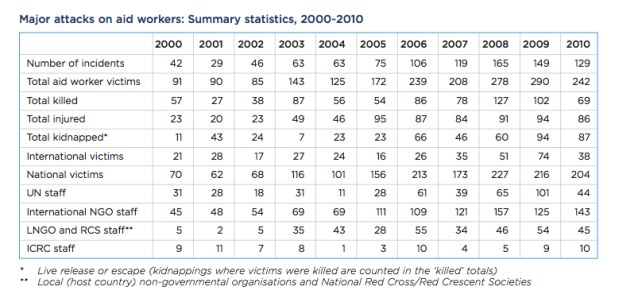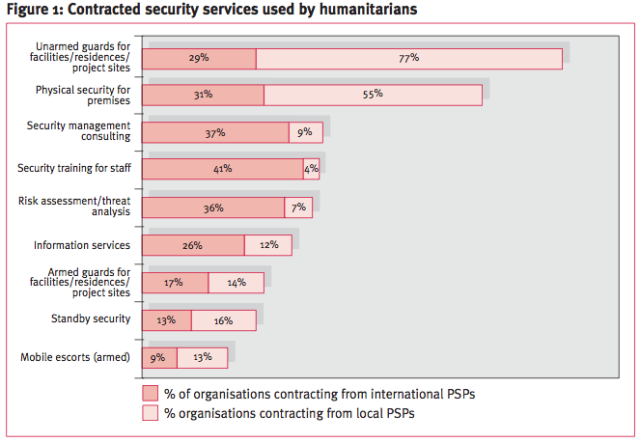“Rwanda was a horrific UN failure where lives were equated to dollars. Doug’s comments aren’t entirely correct: EO wasn’t “between assignments” nor were we on our way to New York. The UN turned it down because we were “too expensive” – even though we were several hundred million dollars cheaper than they were.” –Eeben Barlow on the UN approaching Executive Outcomes to end the Rwandan Genocide
This should be interesting to watch. Although it would have been nice to see a more varied panel that included some actual CEO’s of companies whom have actually contracted with the UN to provide security. Or at least were approached by the UN to provide services….
The other point to bring up is an effort within the UN to establish an ‘international regulatory framework on PMSC’s’. Here is a video of what they are up to. I imagine we will hear more about this effort in the discussion.
For some interesting discussion and background on the UN’s use of PMSC’s, I have covered the subject in prior posts here. Also, just type in Google Search, ‘UN, Feral Jundi’ or ‘United Nations, Feral Jundi’ for more posts about the UN and PMSC’s.
Also, check out the Kings Of War blog and their discussion on the UN’s use of PMSC’s here. (check out the comments by Doug Brooks, David Isenberg, myself and others)
Eeben Barlow also has much to add to the discussion about the UN and PMSC’s here and here. His company, Executive Outcomes, was actually approached by the UN to end the Rwandan Genocide. I wonder if the panel will even delve into this history? –Matt

Mass grave skulls from Rwandan Genocide.
Expert group on mercenaries debates use of private military and security companies by the United Nations
26 July 2013
The United Nations Working Group on the use of mercenaries will discuss the use of private military and security companies (PMSCs) in UN peace and humanitarian operations in the field.
The panel discussion will take place on 31 July 2013 at the UN Headquarters in New York, as part of a special year-long study on the use PMSCs by the UN bodies worldwide, which the expert group will present to the UN General Assembly in 2014.
“As a large consumer of security services, the UN has the opportunity to positively influence the standards and behaviour of the industry to comply with international human rights norms and support the implementation of the UN Charter,” said Anton Katz, who currently heads the expert group charged by the Human Rights Council to monitor and report on the activities of companies providing security and consultancy services on the international market.
“The UN should serve as a model for world Governments and other organizations in its use of private military and security companies,” the expert stressed. “Without proper standards and oversight, the outsourcing of security functions by the UN to private companies could have a negative effect on the effectiveness and image of the UN in the field.”
The five-strong expert body, which has drafted a possible international convention on private military and security companies, has already provided an overview of the UN policy regarding the use of PMSCs in a previous report* to the UN General Assembly in 2010.
The event will feature two panels, focusing on the use of armed security services by the UN and the use of PMSCs in peace operations. Details of the event, including the panelists, are available here.
The panel discussions will be also broadcasted live at the UN web TV.
The Working Group will hold a press conference at 13:30 on 1 August 2013 at briefing room S-237, the UN Headquarters.
The Working Group on the use of mercenaries as a means of violating human rights and impeding the exercise of the right of peoples to self-determination was established in 2005 by the then Commission on Human Rights. It is composed of five independent experts serving in their personal capacities: Mr. Anton Katz (Chair-Rapporteur, South Africa), Ms. Faiza Patel (Pakistan), Ms. Patricia Arias (Chile), Ms. El¿bieta Karska (Poland) and Mr. Gabor Rona (United States/Hungary).Learn more, log on here.
(*) Check the full report to the UN General Assembly here.
Read the Working Group’s draft of a possible Convention on Private Military and Security Companies here.
For more information and media requests please contact: ?In New York: Nenad Vasiæ (+1 212 963 5998 / vasic@un.org) ?In Geneva: Natacha Foucard (+41 22 917 9458 / nfoucard@ohchr.org) or Junko Tadaki (+41 22 917 9298 / jtadaki@ohchr.org) or write to mercenaries@ohchr.org
For media inquiries related to other UN independent experts:?Xabier Celaya, UN Human Rights – Media Unit (+ 41 22 917 9383 / xcelaya@ohchr.org)
Press release here.


